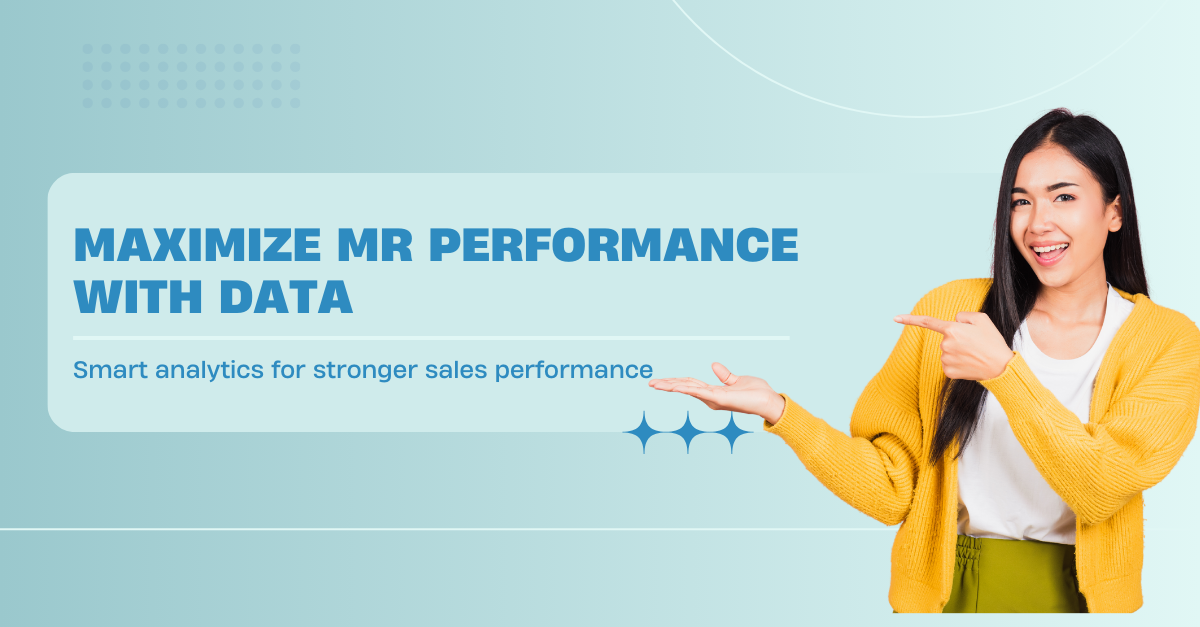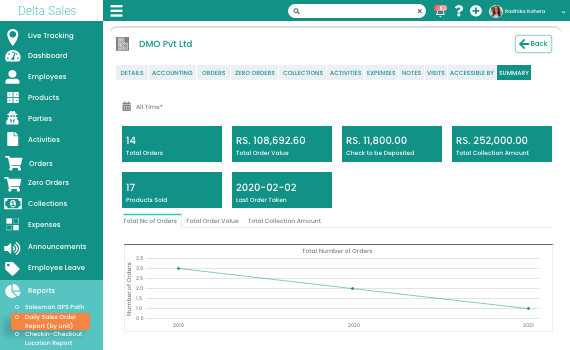Data-Driven Insights for Medical Representative Performance

In the competitive pharmaceutical industry, medical representatives (MRs) are the crucial link between healthcare providers and pharmaceutical companies. Their performance impacts not just sales but also how effectively doctors, pharmacists, and patients receive accurate, timely information about medications and treatments.
Historically, assessing MR performance relied on subjective observations, manual reports, and basic sales data. These methods often fell short in giving a complete understanding of a representative's effectiveness. Today, leveraging data-driven insights offers a modern, actionable path to monitor, evaluate, and improve MR performance, driving better results for both the organization and field representatives. Modern pharma field force management relies on analytics, real-time tracking, and structured performance measurement to ensure maximum impact.
This blog explores how pharmaceutical companies can use data analytics for medical representatives, the tools and techniques involved, and practical steps to implement a data-driven strategy for field sales.
Understanding Medical Representative Performance
Medical representative performance goes beyond achieving sales targets. It is a combination of sales efficiency, relationship management, product knowledge, and adherence to compliance standards. Evaluating MRs requires a holistic view of their daily activities, interactions with healthcare providers, and overall impact on brand performance.
Key Areas of MR Performance
-
Sales Achievement : Meeting or exceeding sales targets is a primary measure of MR effectiveness. However, sales figures alone do not tell the full story. Understanding which products, regions, or healthcare providers contribute most to sales helps managers prioritize high-impact actions and address Challenges in Pharma Field Sales effectively.
-
Healthcare Provider Engagement : A strong MR builds meaningful relationships with doctors, pharmacists, and other medical staff. Tracking the frequency and quality of interactions provides insights into how well representatives communicate, educate, and influence healthcare decisions. Implementing effective doctor visit tracking strategies can significantly improve prescription patterns and brand loyalty.
-
Product Knowledge : MRs must be able to explain product benefits, address concerns, and respond accurately to queries. Tracking knowledge gaps through assessments and monitoring interactions ensures representatives are well-prepared.
-
Territory Management : Efficiently managing geographic areas is vital. Ensuring that all potential clients are reached and visits are optimized for time and effectiveness helps improve coverage and reduces missed opportunities.
-
Compliance and Reporting
Pharmaceutical companies operate in a heavily regulated environment. Accurate record-keeping, proper documentation of interactions, and adherence to ethical guidelines are essential.
By monitoring these areas with data-driven methods, managers can gain a complete understanding of MR performance beyond just sales numbers.
Why Data Matters in Measuring MR Performance
In the past, MR performance management often relied on spreadsheets, anecdotal feedback, or manual reporting. These approaches were slow, prone to errors, and offered limited insights. They made it difficult for managers to identify underperforming areas or optimize field strategies in real-time.

With digital tools for pharmaceutical sales, companies can now collect, process, and analyze vast amounts of data from multiple sources. This allows organizations to:
-
Track Real-Time Performance: Managers can monitor MR activities, visit frequency, sales interactions, and task completion in real time, allowing quick identification of issues and immediate corrective actions to boost productivity.
-
Identify Strengths and Weaknesses: Data analysis highlights where MRs perform strongly and where gaps exist, enabling personalized coaching, targeted training, and actionable feedback to improve overall team performance.
-
Optimize Resource Allocation: By analyzing territory performance, client potential, and visit patterns, managers can assign resources efficiently, balance workloads, and ensure high-value areas receive adequate focus.
-
Predict Opportunities: Insights from historical data can forecast product demand and identify emerging opportunities in specific regions or among particular healthcare providers.
Integrating data-driven insights allows pharmaceutical companies to move from reactive management to proactive strategy. Tools like Delta Sales App offer real-time tracking, performance dashboards, and automated reporting, enabling managers and MRs to act on insights immediately.
Sources of Data for MR Performance Insights
To implement a data-driven approach, it’s important to know where relevant data comes from.
1. CRM Systems
Customer Relationship Management (CRM) platforms track interactions with healthcare providers, including visits, calls, and follow-ups. CRM data provides insights into engagement quality, visit frequency, and overall effectiveness. A well-structured Sales CRM for Pharma Companies ensures every interaction is recorded, measurable, and ready for analysis.
2. Sales Data
Sales performance reports highlight which representatives meet quotas, which products are performing best, and which territories may need attention. This data forms the backbone of any MR performance analysis.
3. Territory Analytics
Geographic insights help ensure representatives cover all potential clients efficiently. With territory analytics, managers can optimize visit schedules, reduce missed opportunities, and balance workloads across regions. Territory management software helps the admin to manage field teams in real time.
4. Feedback from Healthcare Professionals
Surveys and structured feedback from doctors and pharmacists provide qualitative insights into MR effectiveness. This data helps gauge professionalism, clarity of communication, and trust-building capabilities.
5. Training and Certification Records
Monitoring completed training sessions, certifications, and product assessments ensures that MRs maintain the knowledge and skills required to perform effectively.
Transforming Data into Actionable Insights
Collecting data is only the first step. Real value comes from analyzing it and turning it into actionable insights that improve MR performance.
1. Performance Dashboards
Dashboards consolidate multiple metrics such as sales, number of visits, engagement scores, and territory coverage into visual reports. Managers can quickly identify trends, monitor KPIs, and make informed decisions.
2. Predictive Analytics
By examining historical performance data, companies can anticipate challenges, identify potential underperformers, and plan interventions proactively.
3. Personalized Performance Reports
Customized reports for individual MRs highlight strengths and weaknesses. These enable managers to tailor coaching sessions, set achievable goals, and foster continuous improvement.
4. Identifying High-Impact Activities
Not all activities yield equal results. Analysis can reveal which types of doctor visits, educational presentations, or product demonstrations are most effective. This allows MRs to focus on high-value engagements that generate better outcomes.
Benefits of Data-Driven Insights for Medical Representatives
Adopting a data-driven strategy offers clear benefits for both the organization and individual representatives:
-
Improved Accountability : Real-time monitoring of MR activities, visits, and sales interactions encourages consistent performance, fosters transparency with managers, and ensures representatives are accountable for results.
-
Enhanced Training and Development : Data identifies performance gaps and knowledge deficiencies, allowing managers to create tailored training programs that improve product knowledge, skills, and confidence in the field.
-
Optimized Time Management : Insights on territory coverage, client visits, and engagement frequency help MRs focus on high-priority tasks, reducing travel time and administrative workload while maximizing productive output.
-
Better Decision-Making : Managers can rely on objective data to make informed decisions about promotions, resource allocation, territory assignments, and strategic initiatives, reducing reliance on intuition or assumptions.
-
Increased Sales and Market Penetration : By analyzing data on high-potential regions, clients, and product categories, MRs can target their efforts effectively, driving higher sales, better prescription rates, and greater market coverage.
Challenges in Implementing Data-Driven MR Performance Management
Despite the clear advantages of using data-driven insights, organizations often encounter several challenges that can hinder successful implementation. Understanding and addressing these challenges is crucial for maximizing the effectiveness of MR performance strategies.
1. Data Accuracy and Consistency
Incomplete, outdated, or inconsistent data can distort insights, leading to poor decisions. Ensuring accurate reporting requires proper MR training, regular validation, and standardized entry processes.
-
Train MRs on accurate data entry and reporting.
-
Use automated checks to reduce errors.
-
Standardize metrics across all teams.
2. Resistance to Change
Some MRs may view data tracking as intrusive or micromanagement, causing reluctance in adoption. Clear communication and involvement in implementation help overcome resistance.
-
Show how data supports performance, not punishes.
-
Involve MRs in tool adoption to build trust.
-
Highlight positive impacts of analytics on their work.
3. Integration of Multiple Data Sources
MR performance data comes from CRM systems, sales reports, training modules, and feedback. Integrating all sources into one unified platform is technically complex but essential for actionable insights.
-
Use compatible software and APIs.
-
Consolidate all performance metrics in one platform.
-
Reduce fragmented data for clearer analysis.
4. Data Overload
Collecting too much data can overwhelm managers and MRs, making it difficult to prioritize actionable metrics. Focusing on meaningful KPIs ensures clarity, usability, and improved decision-making.
-
Track only meaningful metrics like sales and visits.
-
Filter non-essential information for simplicity.
-
Prioritize KPIs with direct business impact.
5. Maintaining Real-Time Insights
Timely insights are critical for immediate interventions. Delays in data entry or processing can reduce the effectiveness of analytics. Automating reporting and using mobile-friendly dashboards solves this issue.
-
Implement live dashboards for instant visibility.
-
Use mobile-friendly tools for field updates.
-
Automate routine reporting to save time.
6. Cost and Resource Constraints
Advanced analytics tools and integrated platforms can be expensive, especially for smaller pharmaceutical companies. Careful ROI assessment and scalable solutions like Delta Sales App help reduce costs while improving efficiency.
-
Evaluate costs vs. benefits before investment.
-
Use scalable SaaS solutions for efficiency.
-
Reduce upfront costs with integrated platforms.
Step-by-Step Guide to Implement a Data-Driven MR Strategy
A structured implementation plan ensures success by guiding pharmaceutical companies to systematically improve MR performance using data-driven insights.
1. Assess Current Processes : Evaluate how MR performance is tracked and measured, identify gaps in reporting and workflow, and gather feedback from managers and representatives to understand areas needing improvement.
2. Select the Right Tools : Choose CRM, analytics, and field force management software that integrates seamlessly, supports scalability, and provides real-time performance tracking for accurate and actionable insights.
3. Define Metrics and KPIs : Set measurable outcomes such as sales growth, visit frequency, product knowledge, and training completion. Focus on actionable indicators to track performance effectively and drive improvements.
4. Train Your Team : Provide managers and MRs with hands-on training on data-driven tools, dashboards, and analytics, highlighting how insights can improve productivity, engagement, and overall field performance.
5. Collect and Monitor Data : Ensure accurate and timely entry of all MR activities, calls, visits, and sales. Regularly audit and validate data to maintain consistency, enabling reliable analysis and informed decision-making.
6. Analyze and Act : Transform collected data into actionable insights. Identify underperforming areas, optimize territories, tailor coaching, and adjust strategies to enhance MR effectiveness and sales outcomes.
7. Review and Optimize : Continuously refine processes, metrics, and tools based on performance trends, evolving market needs, and feedback from MRs, ensuring ongoing improvement and long-term success of the strategy.
Conclusion
The success of medical representatives (MRs) impacts sales performance, brand reputation, and patient outcomes. Traditional methods often provide incomplete insights, limiting field sales operations. A data-driven MR performance approach offers real-time visibility into activities, strengths, and gaps. Using field force management software, salesforce automation, and actionable performance insights, companies can improve training, accountability, and decision-making.
Transform your field sales team with Delta Sales App for real-time tracking, analytics, and improved MR performance. With a robust pharma field force management approach, companies can enhance training, accountability, and overall sales outcomes. Book Your Demo Today!









